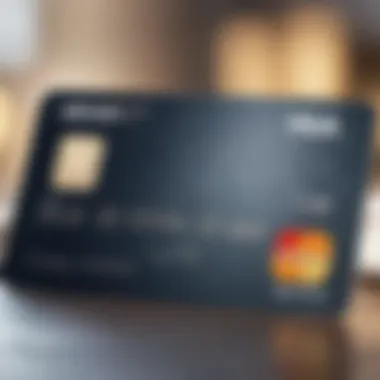A Complete Guide to Reloadable Visa Cards


Intro
In an increasingly digital world, reloadable Visa cards offer a flexible financial option that appeals to many. These cards serve a multitude of purposes, ranging from budgeting tools to easy payment alternatives for online transactions. As we delve into the intricacies of where and how to acquire these cards, we'll also explore their advantages and the convenience they present.
Reloadable Visa cards enable users to load funds as needed, helping manage expenses without worrying about overspending. For Texans on the go or students living away from home, these cards can be especially beneficial. Understanding the various sources you can turn to for obtaining these cards is essential for making informed financial decisions.
This guide will give you a foundational grasp of the available options and some finer points of reloadable Visa cards.
Navigating Finding Reloadable Visa Cards
Financial Institutions
Various banks and credit unions offer reloadable Visa cards, often as part of their supplementary card services. These banks may provide additional perks like lower fees or integrated account management tools. When seeking a reloadable Visa card from a financial institution, consider the following:
- Fees: Annual fees, reloading charges, and ATM withdrawal fees can differ.
- Reloading Options: Some banks allow direct deposit or linking to your primary account for easy reloading.
- Online Banking: Accessibility through mobile or online banking systems can greatly enhance your experience.
Retail Stores
If you prefer a more hands-on approach, many retail outlets have put reloadable Visa cards at your disposal. Popular stores like Walmart and Walgreens often carry these cards. When buying from retail stores, keep an eye on:
- Availability: Not all stores carry the same products, so calling ahead can save time.
- In-store Reloading: Many allowing you to reload your card in-person can be a significant advantage.
Other Sources
Apart from financial institutions and retail stores, some specialty services focus solely on payment solutions. Online platforms provide a different take. Websites like PayPal allow users to link their Visa cards, offering virtual combinations of convenience.
"These reloadable cards are more than just a way to make transactions; they can also serve as an effective budgeting tool."
Advantages of Reloadable Visa Cards
Reloadable Visa cards come with several benefits suitable for a variety of users:
- Financial Control: Setting limits on the card can help avoid debt.
- Security: Unlike cash, if lost, you can report the theft and potentially recover funds.
- Broad Acceptance: They’re widely accepted, just like standard credit cards.
- Budgeting Aid: Users can allocate specific amounts for different purposes, making it easier to track spending.
It's vital to understand the context in which you use these cards. Familiarizing yourself with the fees and reloading mechanics can make a significant difference in your overall satisfaction.
Epilogue
Navigating the world of reloadable Visa cards can feel overwhelming at first, but it certainly doesn’t have to be. Whether you turn to your local bank, a nearby retail outlet, or digital platforms, options abound. The flexibility they offer, paired with the wise management of your finances, can ultimately lead to a more organized financial life. Keep this guide handy to ensure your journey in acquiring and utilizing these cards is as smooth as possible.
Prelude to Reloadable Visa Cards
In the ever-evolving landscape of payment solutions, reloadable Visa cards have carved a unique niche. These cards represent a blend of convenience and flexibility, allowing users to manage their finances without the constraints that come with traditional banking methods. The significance of reloadable Visa cards cannot be overstated. For individuals and businesses alike, the access to these cards offers a breadth of benefits that facilitate easier transactions and enhance financial management.
Understanding Reloadable Visa Cards
At their core, reloadable Visa cards operate like a debit card but with one primary distinction: they can be preloaded with funds, giving users the ability to control their spending habits. You find these cards available through various channels—financial institutions, retail stores, and online platforms, providing consumers with multiple avenues to obtain them. Users deposit a specific amount of money onto the card, and once this amount is spent, they can reload it again. Unlike credit cards, reloadable options do not involve borrowing money, which can simplify budgeting and financial planning.
One should note that many of these cards require a user to provide personal information, a trade-off for the conveniences offered. Users get to enjoy increased spending power without the need for a traditional bank account, thus opening doors for those who may be unbanked or underbanked. Additionally, learners and young adults can use them as effective financial training tools, teaching responsible spending without the risk of maxing out a credit line.
Benefits of Using Reloadable Cards
Using reloadable Visa cards comes with a plethora of advantages:
- Financial Control: Users can set limits on their spending by preloading only what they wish to spend. This will help to avoid overspending, a common pitfall with credit cards.
- Flexibility: You can use these cards for online purchases, in-store transactions, and even for withdrawing cash from ATMs without the hassle that comes with traditional checking accounts.
- Accessibility: Reloadable cards are accessible to a broader audience, including those without access to traditional banking services. Individuals looking for budgeting tools or parents wanting to grant financial autonomy to their children might find these cards ideal.
- Security: Many reloadable Visa cards come with features such as the ability to dispute charges and fraud protection. While there is no perfect security solution, using these cards can help mitigate risks commonly associated with cash transactions.
- Easy Reloading Options: Reloading is often straightforward, whether through direct deposit of paychecks, bank transfers, or cash reloads at participating retailers.
In summary, reloadable Visa cards epitomize a flexible and secure way for consumers to transact and manage their finances.
The role of reloadable cards continues to expand as consumers seek more adaptable payment solutions in a fast-paced economy.
Finding Reloadable Visa Cards
Identifying suitable reloadable Visa cards holds significant weight in navigating personal finances. It's a game changer for those seeking flexibility in spending while allowing for easy management of budgets. Understanding the various sources for these cards equips individuals with knowledge that can promote smarter spending habits and alleviate potential financial stress. By incorporating reloadable Visa cards into your financial portfolio, you gain access to several benefits such as limiting overspending and enhancing purchasing security.
Financial Institutions
Commercial Banks
Commercial banks stand out as a prominent source for reloadable Visa cards. They are well-rooted institutions with established trust and reliability. Generally, customers find that banks offer straightforward procedures for obtaining these cards. The significant advantage here is the developments in technology, allowing customers to manage funds online, making it easier than ever to load and track usage.
Having a reloadable card from a recognized commercial bank often means enhanced security features, including fraud protection and the ability to easily freeze the card if lost. However, a potential flip side is that some banks may impose fees for card issuance or reloading, which could be a drawback for cost-conscious users.


Credit Unions
Credit unions distinguish themselves by providing personalized services and often lower fees than traditional banks. They are nonprofit cooperatives where members have a common bond. This unique structure allows them to pass savings back to members through reduced fees on their reloadable Visa cards.
One notable benefit of using a credit union is the focus on member education, giving insights into managing reloadable cards effectively. However, eligibility can be a hurdle since joining typically requires a connection to a certain community or profession.
Online Banks
Online banks are fast becoming popular for those looking for reloadable Visa cards. With limited overhead costs, they can often offer competitive fees and better interest rates. Significantly, many online banks provide user-friendly apps for tracking and managing the cards, appealing to tech-savvy users.
One unique feature is the ease of setting up direct deposits for your reloadable card, enabling a steady cash flow. Be mindful, though; not all online banks might offer comprehensive customer service, which can be problematic if you face issues with your card.
Retail Stores
Grocery Chains
Grocery chains frequently facilitate changes in consumer spending, particularly by providing reloadable Visa cards. They allow shoppers to purchase these cards as part of their routine shopping. This convenience can save time and add an extra layer of utility as customers can directly load funds while shopping for essentials.
It's worth noting that some grocery chains might run promotions that offer bonus funds when you load a certain amount. However, it's advisable to be aware that card availability may vary by location, meaning some stores may not carry them at all.
Pharmacy Outlets
Pharmacy outlets serve as unexpected but practical locations for acquiring reloadable Visa cards. These places can be especially accommodating to those who aren’t banked and seek accessible financial instruments.
The advantage here lies in the discreet nature of pharmacies, making them a comfortable spot for financial transactions without drawing undue attention. However, similar to grocery chains, consumers should expect limited selection and variability in fees.
Convenience Stores
Convenience stores are known for their simple yet effective services. They provide reloadable Visa cards at times when you’re in a rush or during odd hours when banks or grocery stores may be closed. Their extended hours are a key characteristic that many busy professionals appreciate.
However, while they offer very easy access, the fees can sometimes be higher, and the available services may be limited when compared to banks or primary retail outlets.
Online Platforms
Official Websites of Card Providers
The websites of card providers serve as the cornerstone for purchasing and managing reloadable Visa cards. They present comprehensive information about card features, fees, and how they can fit into one's financial strategy.
Often, these websites will have specific tools, such as load calculators, to help users understand the costs associated with different card options. Additionally, many of them provide promotions directly through online channels, which can enhance savings or earn rewards. Yet, the overwhelming choices can be confusing, making it critical to do your research meticulously before committing.
Third-Party Financial Services
Third-party financial services act as an intermediary between consumers and reloadable Visa cards. They often have partnerships with multiple card issuers, providing broader choices and comparisons for users.
The best part about these platforms is their ability to filter options based on personal preferences, enabling a tailored search experience. Still, a downside might be higher fees or less personalized service, as these providers often focus on volume rather than client relationships.
Digital Wallet Applications
Digital wallet applications represent the cutting edge of reloadable Visa card convenience, merging technology with finance. These apps allow users to load funds electronically, track spending on the go, and often link other financial accounts, enhancing usability.
The unique aspect of these apps is their integration with smartphones, allowing for quick transactions without needing physical cards, which is a definite plus for the digitally inclined. However, barriers may include dependency on technology and potential security risks if connections aren’t securely managed.
With various options available, understanding where to locate reloadable Visa cards can significantly empower one's financial decisions and boost confidence in spending habits.
Types of Reloadable Visa Cards
Understanding the different types of reloadable Visa cards is essential for making informed financial decisions. Each category brings unique features and benefits designed to cater to varied needs. Whether you're looking to manage everyday expenses or explore rewards systems, knowing the types can help align your choices with your financial goals. This section will focus on three prominent types: standard reloadable cards, rewards-based reloadable cards, and gift-style reloadable cards.
Standard Reloadable Cards
Standard reloadable Visa cards are the bread and butter of this financial product category. These cards can be refilled with funds repeatedly, allowing for flexibility in spending without incurring debt like a traditional credit card might.
- Usage Flexibility: You can use these cards for everything from grocery shopping to online purchases, providing a straightforward and convenient payment method.
- Budget Management: They act almost like a cash budget, where you can only spend what you load, making them ideal for individuals who want to stay away from overspending.
- Easy Reload Options: You can reload funds at numerous locations like grocery stores, banks, or through direct deposits.
This type covers the basics, offering reliability without any frills. Whether you are a student learning to manage finances or someone who needs a simple card for everyday use, standard reloadable cards often fit the bill.
Rewards-Based Reloadable Cards
For those who enjoy gaining something back from their spending, rewards-based reloadable cards are a great alternative. This category focuses on providing bonuses, such as cash back or points, with each reload or purchase. Here are some key aspects:
- Potential Financial Incentives: Users can earn rewards for every dollar spent. For example, a card might give you 1% back on all purchases. Over time, these small amounts can add up, providing tangible benefits.
- Special Promotions: Some issuers may offer special promotions that can lead to greater rewards during specific periods, especially around holidays or shopping seasons.
- Variety of Redemption Options: Earned rewards can typically be redeemed in various ways, like gift cards or even statement credits, allowing users to choose what fits best.
If you are savvy in your spending habits, rewards-based reloadable cards can turn everyday purchases into opportunities for savings or bonuses. It’s a win-win situation for consumers who enjoy possibilities of added value on their purchases.


Gift-Style Reloadable Cards
Gift-style reloadable cards offer a fun twist on the standard reloadable options. These are often aesthetically designed to be given as gifts rather than for personal use. Understanding their advantages can open up unique ways to manage gifting:
- Thoughtful Gifts: Instead of giving cash, a gift-card can be more personal. It allows the recipient to choose what they want while ensuring they have the ability to spend wisely.
- Controlled Spending Limits: They come pre-loaded with a specific amount and can be reloaded by the giver. This ensures recipients do not overspend, maintaining control over finances.
- Customizable Designs: Many cards come with customizable designs that add a personal touch.
Gift-style reloadable cards are an excellent choice when you wish to empower someone to make their own choices without the complications of cash. They merge the convenience of a gift card with the flexibility of reloadability, making for an attractive option in a culture where financial independence is praised.
"Choosing the right type of reloadable Visa card can simplify your budgeting while providing a safety net for financial management."
How to Purchase Reloadable Visa Cards
Understanding how to properly purchase reloadable Visa cards is paramount for individuals looking to enhance their financial flexibility. With a variety of options available, navigating this process can significantly impact the overall user experience. Knowing where and how to buy these cards not only simplifies transactions but also grants users access to various benefits like budgeting and secure spending. Therefore, acquiring crucial knowledge about purchasing methods can foster informed decisions, aligning with one's financial strategies.
In-Person Purchases
In-person purchases provide a tangible way to obtain reloadable Visa cards. This method can feel more personal and direct, offering immediate access to the card without the lag of shipping. However, consumers must be aware of their surroundings to ensure that they choose the right store for the best deal.
Identifying Suitable Retailers
Identifying suitable retailers is an essential step in the process of in-person purchases. Ideal retailers often include large department stores, grocery chains, and pharmacies. These venues tend to keep reloadable cards readily available at their customer service counters or checkout aisles. A key characteristic of these retailers is their accessibility; many of them are located in every neighborhood, making it easy for consumers to find one close by.
A unique feature that stands out when it comes to identifying these retailers is their often regular promotions or discounts which can save customers money on the purchase. However, keep an eye on local variations and inventory stock, as availability can differ drastically based on location. This could lead to dissatisfaction if customers find themselves visiting a store that has run out of stock.
Understanding Purchase Limits
Understanding purchase limits is a crucial aspect of acquiring reloadable Visa cards in person. Each retailer may have specific restrictions regarding the maximum amount one can load onto a card initially. For instance, some stores might allow a loading limit of $500 per transaction, while others could permit only $100. This is important because it influences your purchase and usage strategy.
One major advantage of being aware of purchase limits is that it helps manage expectations. If you know that a retailer has a lower limit, you can strategize to make multiple transactions or look for a store that offers higher limits instead. However, keep in mind that not understanding these limits could lead to hiccups in your financial planning, which is something no one wants to deal with at the checkout counter.
Online Purchases
Online purchases represent another convenient avenue for acquiring reloadable Visa cards. This method provides the ease of shopping from home, eliminating the need for a physical journey to a store. Yet, opting for online transactions requires a careful selection of platforms to ensure reliability and security.
A Reliable Online Retailer
A reliable online retailer plays a pivotal role in the ease of purchasing reloadable Visa cards. Reputable platforms include the official websites of Visa, as well as trusted financial institutions such as Chase or Capital One.
Key characteristics of these retailers are their robust security measures, ensuring safe transactions for customers. This provides a peace of mind that an unknown site may not offer. A unique feature about official sites is that they often provide comprehensive customer support in case any complications arise during the purchase process. A con, however, is that navigating these sites can sometimes feel cumbersome due to the multitude of services offered, so it might take a bit longer to find your desired card.
Setting Up Accounts
Setting up accounts is crucial for online purchases of reloadable Visa cards. Many platforms require users to create an account before making a purchase, which can also serve as a method for tracking spending and reloading the card in the future. The key characteristic of setting up an account is the personalized user experience, which can distinctly enhance the overall process.
One beneficial aspect of this feature is that it often enables users to save preferences for future transactions, making subsequent reloads easier. However, one drawback to consider is the time it may take to set up your account initially, including the need to remember login information. It may seem small, but these details can add up when trying to ensure a smooth purchasing experience.
The way you purchase and manage your reloadable Visa card matters significantly, affecting not just immediate availability but also long-term convenience and security.
Reloading Your Visa Card
Reloading your Visa card is a fundamental aspect of ensuring that you can access funds whenever needed. This section delves into the various reloading methods and why they matter. Reloadable Visa cards offer convenience, and understanding how to properly fund them is crucial for their effective use. Knowing the different options available not only maximizes their utility but also supports your financial management.
Options for Reloading
In-Store Reloading
In-store reloading is a straightforward process that allows users to add funds to their reloadable cards at various retail locations. Many grocery stores, drugstores, and convenience shops provide this service, making it a readily accessible choice. What stands out about in-store reloading is its immediacy. Funds are available on your card almost instantly.
The primary advantage of in-store reloading lies in the convenience it presents. Whether you are picking up groceries or simply running errands, you have the opportunity to add cash to your card without hassle. However, it is crucial to be aware of the potential reloading fees that can vary widely among retailers.
In-store methods also tend to limit users to cash or debit transactions, which might be a drawback for those who prefer to manage funds digitally.
Bank Transfers
Bank transfers offer a more digital-focused approach to reloading your Visa card. By linking your reloadable card to your bank account, you can easily transfer funds directly. This method is particularly beneficial for those who prefer to manage their finances online, as it allows for seamless transactions from the comfort of your home.
One notable feature of bank transfers is the ability to set them up as scheduled deposits. This means you can automate your reloads, ensuring that your card is always funded. It saves users from the need to constantly monitor their balance or make in-store visits.
However, keep in mind that not all cards support bank transfers, and there may be limits on the amount you can transfer at one time. This method can also take a few business days for the funds to appear, depending on your bank and card issuer, which may be a disadvantage for those needing quick access to funds.
Direct Deposits
Direct deposits provide another convenient option to keep your reloadable Visa card topped up. This can be especially helpful if you receive regular payments, such as a salary or government benefits. By having your funds deposited directly onto your card, you eliminate the need for cash handling or bank transfers altogether.


The key characteristic of direct deposits is their reliability and ease. You can set up direct deposits with employers or government agencies for automatic transfers to your Visa card. This could be particularly advantageous for those who prefer a no-fuss approach to managing their finances.
Yet, a few potential drawbacks exist. For example, if your direct deposits are not consistent or if there are delays in processing, you might face periods without access to funds. It's best to remain informed and plan accordingly.
Reloading Fees and Limits
Reloading your Visa card isn't always without cost. Fees and limits can vary based on reload methods and the card issuer. It's wise to research and understand these aspects. Some methods might be free, while others can add a significant cost to your overall expenses. Additionally, knowing your card's limits can help prevent unpleasant surprises when you're trying to add more funds.
In summary, navigating the landscape of reloading a Visa card involves considering convenience, costs, and your personal financial habits. Make informed decisions that align with your financial goals.
Security Considerations
When dealing with reloadable Visa cards, security is paramount. These cards serve as a bridge between cash and traditional bank account transactions, yet they involve risks that users must navigate. A good understanding of the risks associated with these cards enhances consumer confidence, and ultimately, user experience. Not only do security considerations protect finances, but they also improve the overall usability of these cards.
Protecting Personal Information
The foremost aspect of security when using reloadable Visa cards is safeguarding personal information. Each time a transaction occurs, personal data is shared, willingly or otherwise. Users should make it a habit to review privacy settings associated with their cards. Make sure that your personal identification details—not just your card number—remain confidential. Opt for secure websites (look for URLs starting with "https") when reloading online.
Moreover, having a unique PIN for your card can safeguard it from unauthorized access. As a rule of thumb, steer clear of using easily guessable numbers like birthdates. Password management tools can help in keeping information safe and organized.
"The key here isn't just to be reactive; it’s to proactively prevent breaches before they happen."
Recognizing Fraudulent Activities
Fraudulent activities can manifest in numerous ways, and as such, being able to recognize them is just as essential as safeguarding personal information. For instance, if transactions appear on your statement that you don't recognize, report them immediately. Timeliness is crucial; many card issuers have policies that limit liability for unauthorized charges if reported promptly.
Be vigilant about phishing schemes, which often arrive via email or text, offering deals that sound too good to be true. Don’t click on suspicious links. Always visit service provider websites directly for information. Additionally, familiarize yourself with the signs of skimming devices at ATMs, such as unusual attachments or misplaced card readers.
- Regularly monitor transaction history.
- Set spending alerts for large amounts.
- Enable transaction notifications for every purchase.
Adopting these habits can significantly mitigate risks associated with the usage of reloadable Visa cards. Ultimately, security isn't just about protecting money; it’s about fostering peace of mind for the cardholder.
Comparative Analysis of Card Providers
In the landscape of reloadable Visa cards, understanding the competitive offerings of various card providers is indespensable. This section highlights how different issuers can cater to specific needs, thus helping users to make educated decisions. By dissecting the features, fee structures, and unique attributes of prominent issuers, individuals can align their choices with personal financial goals and preferences.
Major Visa Issuers
Bank Issuers
Bank issuers play a significant role in the reloadable Visa card market. They offer stability and trust, being established entities in the financial sector. One of the key characteristics of bank issuers is their availability of traditional banking services like overdraft protection and integrated mobile banking functionalities.
Their reloadable cards often come with less stringent credit checks, making them accessible to a broader audience. For instance, Chase Bank provides a reloadable card that integrates seamlessly with your existing bank account, enabling quick reloading and management of funds. This can be beneficial for those who wish to avoid the hassle of juggling multiple accounts.
However, a notable downside is that some have higher fees than non-bank issuers. For example, monthly maintenance fees or transaction fees could eat away at the available balance. It’s vital to review these costs to understand how they could affect long-term user experience.
Financial Technology Companies
On the other end of the spectrum, financial technology companies, such as PayPal and Green Dot, bring a fresh approach to reloadable Visa cards. Their primary appeal lies in technology-driven solutions, providing a modern interface and user experience. A key characteristic of these companies is their emphasis on low fees and rewards for transactions, making them particularly attractive for frequent users.
For instance, the PayPal Prepaid Mastercard comes loaded with benefits like cashback offers and promo deals where users can earn while they spend. This is a significant advantage for tech-savvy individuals who prioritize efficiency and value.
Nonetheless, while fintech firms often boast lower fees, some may lack the extensive customer service networks that traditional banks offer, potentially leaving customers with less support during issues or emergencies. This is an essential consideration for individuals who may require more hands-on assistance.
Evaluating Features and Fees
When assessing reloadable Visa cards, it’s crucial to evaluate features and fees associated with each provider. Considerations such as:
- Reloading options: Does the provider allow easy access to reloading funds through ATMs, direct deposit, or merchant locations?
- Monthly fees: Are there maintenance fees and how do they compare against the services provided?
- Transaction limits: What are the limits for daily spending or ATM withdrawals?
- Customer support: How accessible and responsive is customer service?
Closure and Future Perspectives
Reloadable Visa cards present a range of financial solutions for individuals seeking flexibility and control over their spending. As we conclude this guide, it’s vital to reflect on the ramifications associated with using these cards and the potential future developments that could reshape the landscape of payment options.
Summary of Key Points
Over the course of our discussion, we covered several fundamental aspects of reloadable Visa cards that merit reiteration:
- Accessibility: These cards are widely available through multiple channels including banks, retail stores, and online platforms, thus catering to a broad audience.
- Flexibility: Reloadable Visa cards can serve various purposes, from everyday purchases to budgeting tools for specific expenses.
- Financial Management: Many reloadable cards offer features that help track spending and manage finances, paving the way for better money management practices.
- Security Features: Incorporating security measures, users can protect their funds against unauthorized transactions, distinguishing them from traditional cash usage.
These critical points highlight how reloadable Visa cards can effectively broaden financial accessibility and enhance one’s economic management.
Potential Trends in Reloadable Cards
Looking ahead, several trends may emerge as reloadable Visa cards continue to evolve:
- Technological Integration: As fintech companies innovatively merge payment solutions with technology, we might witness features like real-time spending updates, AI-based budgeting tools, and enhanced security protocols.
- Sustainability Focus: A growing emphasis on environmental consciousness could lead to a rise in eco-friendly cards, promoting reduced plastic use and more sustainable practices within the financial sector.
- Increased Adoption by Businesses: Businesses may increasingly adopt reloadable cards for employee expenditures, streamlining expense management and reinforcing accountability.
- Enhanced Financial Education: With the growing demand for financial literacy, there will likely be more resources available alongside reloadable card offerings, helping users to maximize the benefits of these financial tools.
In summary, reloadable Visa cards hold the promise of being more than just a payment solution; they are part of a larger shift towards greater financial autonomy and sophistication. Recognizing these potential trends is essential for anyone considering or investing in reloadable cards. By staying informed and adaptable, users can better navigate the ever-changing financial landscape.



